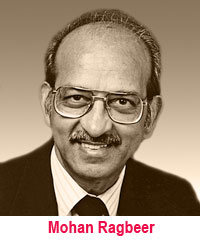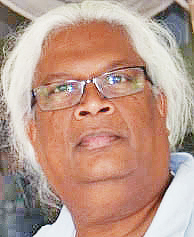Opinions
Canada 150

Rather like Trump today, Canada did not welcome people like me before 1966, and I was almost jailed in Kitchener for just enquiring re migration rules.
In The Indelible Red Stain, I described it thus: “I recall vividly in 1964, soon after completing specialisation, briefly visiting family in Kitchener, Ontario, from New York City. One day, a physician friend informed me of a new position in a southern Ontario hospital in my specialty that had remained vacant for over two years; he called the administrator, who was delighted with my qualifications and invited me to apply. I already had an excellent offer at Columbia University, New York, but was persuaded to visit the Kitchener immigration office to inquire about migrant requirements. I was rudely told by the officer on duty – himself a migrant from somewhere in Eastern Europe, judging by his name and accent – that I should leave Canada forthwith or be arrested for breach of Canadian entry regulations. Shades of Komagata Maru! It seemed that the mere act of inquiry from an Indian was then enough to trigger horrendous fears of a brown invasion. He even extended his threat to the hospital director, a white Canadian physician, who had offered to speak to any officer who might call for verification of the hospital’s interest. Changes began slowly three years later, just in time to provide a destination for the many persons – Indians especially, since they were previously specifically barred – displaced by the rise of ‘socialist’ dictators in newly independent ex-colonies of the Caribbean, South America and Africa.”
I had introduced this book with these lines, “A nation’s history rightly includes accounts of its minorities – why they settled where they did, especially among cold and reticent hosts, knowing that they will be underdogs, and must work twice as hard to get half as far. Canada, USA and the UK have acquired a substantial minority of East Indians in the past 50 years. Why did they leave their homelands to struggle in these lands, knowing their history of bias and rejection? Canada’s ‘whites only’ policy gelled with the Komagata Maru incident of 1913 and federal decision to exclude Indians, using some of the most hypocritical legislative ruses one can find anywhere. The US Asian Exclusion Act of 1917 was equally xenophobic. Reforms in both countries in the mid-1960s made selected migration possible, and charted Canada’s multiracial society. Canada’s abominable treatment of a boatload of 340 Sikhs, 24 Muslims, and 12 Hindus who had arrived in Vancouver in 1913 on the Japanese ship Komagata Maru has become a symbol of the most inhuman elements of racial bigotry and breach of trust, as expressed by Canadians and British during and after the event, showing that the phenomenon had existed for a very long time. Two months of imprisonment on board ship at Burrard Inlet, BC, and denial of food and water were followed by forced deportation, reflecting the callous disregard of even elementary decency by the highest levels of the ‘civilised Christian’ governments of British Columbia and Canada.
“Antagonism to brown folk had developed before that. By 1900, there were merely 2000 Indians living in Canada, mostly Punjabis, proud of their British citizenship, and more loyal to Britain than to India. As numbers rose and began to include more Hindus (Canadians called all Indians Hindus, with generous injections of the epithet “savage”), one H.H. Stevens, on becoming head of the Asiatic Exclusion League in 1907 explained the League’s mission to keep Canada white, pontificating that “the destiny of Canada is best left in the hands of the Anglo-Saxon race.” Exclusionary legislation followed as did sanctions against domiciled Indians, some of whom were Canadians by birth. (They would have to wait nearly fifty years for any semblance of fairness, but equality would elude them to this day.)”
I can thus celebrate 50 years of Canada’s independence, but 150 would seem hypocritical. Similarly, I do not celebrate Guyana’s May 26th independence anniversary, as that commemorates the date of the Wismar massacre of Indians by Burnham’s mobs in 1964, and seems to be deliberately needling Indians who dare to remember.
Young girls grew up overworked, oppressed
 Romeo Kaseram
Romeo Kaseram
Some days I wonder why the girls growing up around me back home had life so hard. It was as if they were born into hard labour the day after they took that first walk, lifting up from off the ground from creeping as babies to take a first step, then to be handed a broom in one hand, and a pot-spoon in the other.
I recall this from my boyhood days growing up back home, where wanting to play a game of cricket, and putting the team together, meant we had to do so without the girls. It was as if we were born to inhabit different worlds.
So to walk up to the gate of one of the strongest players among us, a young lady of promising talent with the bat, and also a wizard at bowling the ball directly and uncomfortably at the toes, and rattle at the gate, calling, “Good evening! Good evening!” would meet with the sternest of greetings from her no-nonsense mother.
“Could Drupati come out and play cricket,” we would chorus, holding up our bats as evidence we were honestly going to set up shop on the quiet street at the back of our houses. Drupati’s mother, her hands on her waist, would give us the stern up-down, shaking her head in the negative without even assessing our request.
Drupati would be in the background, her eyes penetrating her mother’s back, hoping for the go-ahead to come out and join our shouts of joy as the ball slammed into the overturned dust-bin that was our wicket, or was hit for six into a kitchen garden.
“What happening to you idle boys!” her mother would respond. “Why are you wasting your time playing cricket on the road. Don’t you have homework to do?”
I always drew from the depths of the books I read, which for some reason irritated the adults around me. This time I said, respectfully, “Auntie, the wise people who write books say, ‘All work and no play makes Jack a dull boy.’”
At which Drupati’s mother, narrowing her eyes at me, and wagging a forefinger in warning, replied, “Young man, don’t you be rude with me. You are using book knowledge too freely in this place. Drupati is never coming out to play cricket on the road. Besides, what you’re telling me only applies to people living in those foreign countries you always reading about. And besides, there is nobody living in this house whose name is Jack.”
So, with her disappointment showing wet in her eyes, Drupati was sent to the back of the house, where she was commanded to sweep up the backyard with the stiff bristles of the broom made from the spines in the coconut leaves, which we called a ‘cocoyea’ broom. After this, she had to fill buckets of water, which she carried with straining arms from the public standpipe to the backyard, where she then washed the dishes using a mix of ashes from the fireplace and the coarse, blue soap. When this was done, she had to pick up the sun-dried clothes hanging from wires strung among the trees in the backyard.
So it was, the list of duties went on and on as the day drew to a close. Then the chickens came in to roost, expecting Drupati to fling before them handfuls of cracked corn, even as she sang to the heavy flutter of wings, “Ack! Ack! Ack! Come, chickens, come get corn. Ack! Ack! Ack!”
Meanwhile, we were spoiled as boys, each of us a little prince in our homes, the star-apple in the eyes of both grandmother and mother alike. There was always a treat waiting for us from either hand, whether it was a mango ripened among the grains of rice in the rice-pan, or a peeled stalk of sugar-cane notched with a knife into bite-sized pieces by this loving, maternal presence so there was no difficulty in breaking the fibres to get at the sweet, sugary juice.
There was no such attention paid to the Drupatis among us. Instead, it was chore after chore, task after task, morning, noon, and night.
“Drupati, chase those chickens away from the pigeon peas drying in the sun! Where are your eyes? Behind your head?” Meanwhile, poor Drupati would be arms-deep in the washtub, her fingers sore from beating and scrubbing her father’s work pants. Along with the insults, there were more tasks: “Drupati, make sure the firewood is lighting properly. Do you think you’re driving mosquitoes away with all that smoke in the kitchen?!”
Meanwhile, each of us boys, being a rajah, or a king, in our domain, would be having a majestic bath, the water warmed by the sun poured down on top of our heads by a loving mother or grandmother.
It came to be my peers grew up believing their sisters were to be bossed around, cajoled, insulted, and pushed beyond endurance. Even as I grew up, a few of my friends were already being disrespectful to their oppressed sisters, the promising cricketers as Drupati.
